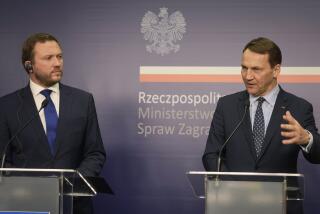Annexed Baltic States : Envoys Hold On to Lonely U.S. Postings
- Share via
WASHINGTON — Tucked away in a gray brick row house on a quiet but unpretentious street about 40 blocks from the White House, Latvia’s senior diplomat spends his time renewing passports, talking to State Department officials and keeping track of the political situation at home--the usual routine of embassy officers all over Washington.
These days, Anatol S. Dinbergs, chief of the Latvian legation, is also avidly watching the reports of new political ferment in Latvia and its neighboring Baltic republics of Lithuania and Estonia. But only as a spectator and only with a sense of painful isolation.
Latvia, Estonia and Lithuania--alone among the 154 nations on Washington’s official diplomatic list--exercise no sovereignty at home. The three Baltic republics have not been independent nations for almost half a century.
‘Totally Repressed’
“We keep people informed of the present situation as much as we can,” said Dinbergs, whose state was absorbed into the Soviet Union in 1940. “ . . . For our people, who have been totally repressed for over 40 years, it is a necessity for them to be able to speak out.”
The United States, joined by most of Western Europe, refused to recognize the annexations that resulted from a deal preceding World War II in which Soviet dictator Josef Stalin and Nazi dictator Adolf Hitler agreed to divide large portions of Eastern Europe between them.
As a result, the three tiny states have continued to enjoy diplomatic representation in the United States. Latvia and Lithuania maintain legations in Washington while Estonia is represented by a consulate in New York.
But working in these offices can be a lonely and difficult job. Unlike other diplomats, the representatives of the Baltic states face daily reminders that their nations are not free. When unsuspecting Americans apply for visas, as happens regularly, they must respond that their countries are “under occupation.”
Visas at Soviet Embassy
Visas to visit Latvia, Lithuania and Estonia can be obtained from the Soviet Embassy, of course, but the Baltic diplomats try to avoid telling people that.
Dinbergs and Ernst Jaakson, Estonian consul general in New York, were both appointed to diplomatic posts in the United States before 1940 by the independent governments of their countries. They are now the last active diplomats who were appointed by a free Latvian or Estonian government.
Dinbergs was elected chief of the Latvian diplomatic service in 1971 by other Latvian diplomats. As such, he can make new diplomatic and consular appointments, provided that they comply with the requirements of the host government. But most Latvian diplomatic posts outside the United States are empty.
The last free government in Lithuania made advance preparations to perpetuate its diplomatic service. Just before Soviet forces entered the capital, the Lithuanian foreign minister selected a chief diplomat who would serve for life and was empowered to pick a successor. The chief appoints other diplomats.
Stasys A. Backis, a Washington resident who serves as political counselor at the Lithuanian legation, currently is the chief diplomat. In a curious twist, Backis has appointed his superior in Washington, Stasys Lozoraitis Jr., the head of the Lithuanian legation.
Lozoraitis, the son of a former Lithuanian diplomat, is also accredited as Lithuanian envoy to the Vatican, a double job that requires him to fly frequently between Washington and Rome.
“In diplomatic history, this is unheard of, to maintain diplomatic representation more than 45 years after the occupation of the country,” Lozoraitis said. “Is it worth keeping up the whole thing? Sometimes we are accused of representing nobody. But we are a symbol of resistance.”
‘Time Warp’
John Zerolis, the Baltic desk officer at the State Department, said: “We’re looking at a time warp in American diplomatic history. In 1940, a great injustice was done to three small states. The diplomatic missions represent a political presence of three countries which have never recovered from World War II.”
All three Baltic legations continue to issue passports, although immigration or customs officers may look askance at them, and most Estonians, Latvians and Lithuanians also hold citizenship in some other country. Jaakson said that in recent weeks, Estonian dissidents from throughout the world have come to him for Estonian passports.
“This is the only place in the world where Estonian passports are issued,” Jaakson said, gesturing to his office on the 14th floor of a skyscraper in New York’s Rockefeller Center.
Baltic Passports
The run on Baltic passports resulted from sudden displays of nationalism in Estonia, Latvia and Lithuania, where newly minted “popular front” organizations have demanded political and economic autonomy within the Soviet system. The fronts, led by local Communists but also including non-Communist elements, have not asked for independence from Moscow, but they have sought to test the limits of Soviet President Mikhail S. Gorbachev’s policy of glasnost, or openness.
The new political ferment came as a surprise both to the State Department and the Baltic diplomats in the United States. They are not quite sure how to react.
“ Glasnost is breaking out all over the Baltic,” Zerolis said. “It’s a whole new ballgame.”
But he said the popular fronts arose without the help of the United States, emigre organizations or the Baltic legations in the United States.
“We can’t export freedom,” the State Department official added. “We’ve tried that.”
Communist Trick Feared
The Baltic diplomats say they are thrilled by the news from home. But they still fear a Communist trick.
“Maybe Gorbachev chose the Baltic states as a test case for glasnost because Russians wouldn’t speak out except to say they wanted more food on the table,” Dinbergs said.
“The Estonians are very brave to test the Soviets,” Jaakson said. “They have come out very strong in defense of human rights and legal rights.”
But he said he is concerned because “the Estonian Communist Party has taken charge of the popular movement.” He said that some non-Communist nationalists have been deported.
Dinbergs said it would be helpful to the cause for the U.S. government to add the situation in the Baltic states to its usual agenda for high-level meetings with the Soviet Union. But he said he does not expect much else from Washington.
‘Non-Recognition Policy’
“I don’t see that we could expect them (the U.S. government) to do anything at this stage,” he said. “They continue their non-recognition (of the Soviet annexation) policy. I don’t think we could expect them to do something more drastic on their own.”
For a long time, nations that recognized Baltic missions would accept only diplomats who had served in the diplomatic corps of an independent Estonian, Latvian or Lithuanian government. The result of that rule would be to phase out the Baltic legations as the aging diplomats died off. The United States changed that rule several years ago and agreed to accept other appointees.
Lozoraitis, who was a child when Lithuania was last free, said that many Western European nations now consider Baltic diplomats to be an irritant to improved relations with Gorbachev’s Moscow.
“They consider us a pain in the neck because it would be much easier for them if we did not exist,” he said.
The three Baltic missions enjoy the same privileges as other embassies and consulates. But they have to operate on a very tight budget because they are unable to write home for money.
Gold Reserves
As independent states, Estonia, Latvia and Lithuania all owned gold reserves that were in banks in the United States. The gold was seized at the time of the Soviet annexation and was later turned over to the Baltic diplomatic missions.
It is not clear just how much money is left in those accounts. Zerolis of the State Department said that the reserve is certainly dwindling, but he declined to estimate its current size. He said the missions fill in by raising money from Baltic emigre groups, but he insisted that no U.S. government money is involved.
More to Read
Sign up for Essential California
The most important California stories and recommendations in your inbox every morning.
You may occasionally receive promotional content from the Los Angeles Times.













